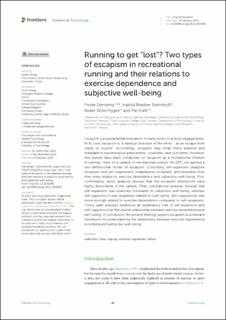| dc.contributor.author | Stenseng, Frode | |
| dc.contributor.author | Bredvei Steinsholt, Ingvild | |
| dc.contributor.author | Hygen, Beate Wold | |
| dc.contributor.author | Kraft, Pål | |
| dc.date.accessioned | 2023-08-29T06:43:57Z | |
| dc.date.available | 2023-08-29T06:43:57Z | |
| dc.date.created | 2023-02-13T14:34:14Z | |
| dc.date.issued | 2023 | |
| dc.identifier.issn | 1664-1078 | |
| dc.identifier.uri | https://hdl.handle.net/11250/3086086 | |
| dc.description.abstract | Escapism is a fundamental motivation in many forms of activity engagements. At its core, escapism is “a habitual diversion of the mind … as an escape from reality or routine”. Accordingly, escapism may entail many adaptive and maladaptive psychological antecedents, covariates, and outcomes. However, few studies have been conducted on escapism as a motivational mindset in running. Here, in a sample of recreational runners (N = 227), we applied a two-dimensional model of escapism, comprising self-expansion (adaptive escapism) and self-suppression (maladaptive escapism), and examined how they were related to exercise dependence and subjective well-being. First, confirmatory factor analyses showed that the escapism dimensions were highly diversifiable in the sample. Then, correlational analyses showed that self-expansion was positively correlated to subjective well-being, whereas self-suppression was negatively related to well-being. Self-suppression was more strongly related to exercise dependence compared to self-expansion. Finally, path analyses evidenced an explanatory role of self-expansion and self-suppression in the inverse relationship between exercise dependence and well-being. In conclusion, the present findings support escapism as a relevant framework for understanding the relationship between exercise dependence in running and subjective well-being. | en_US |
| dc.language.iso | eng | en_US |
| dc.publisher | Frontiers | en_US |
| dc.rights | Navngivelse 4.0 Internasjonal | * |
| dc.rights.uri | http://creativecommons.org/licenses/by/4.0/deed.no | * |
| dc.title | Running to get “lost”? Two types of escapism in recreational running and their relations to exercise dependence and subjective well-being | en_US |
| dc.title.alternative | Running to get “lost”? Two types of escapism in recreational running and their relations to exercise dependence and subjective well-being | en_US |
| dc.type | Peer reviewed | en_US |
| dc.type | Journal article | en_US |
| dc.description.version | publishedVersion | en_US |
| dc.source.volume | 13 | en_US |
| dc.source.journal | Frontiers in Psychology | en_US |
| dc.identifier.doi | 10.3389/fpsyg.2022.1035196 | |
| dc.identifier.cristin | 2125682 | |
| cristin.ispublished | true | |
| cristin.fulltext | original | |
| cristin.qualitycode | 1 | |

